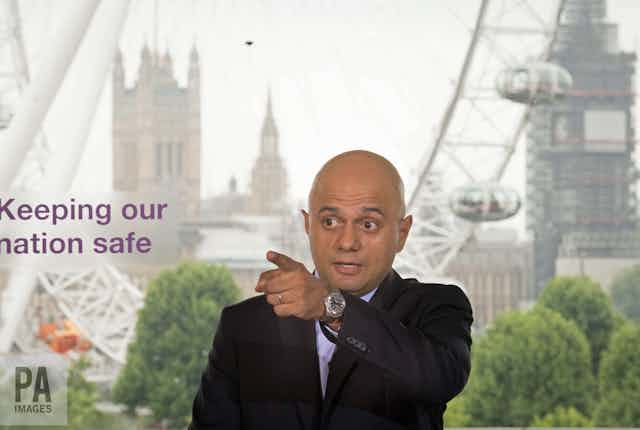Launching the British government’s revised counter-terrorism strategy (Contest), the home secretary, Sajid Javid, announced that personal information on British citizens held by MI5 is to be declassified. It will be shared with local authorities, police and others to help with their counter-terrorism work.
From reports, this information relates to around 20,000 “suspect” people. This raises significant concerns about breaching human rights. These people are guilty of nothing except that they are considered “suspects”.
Admittedly, government agencies already share significant amounts of sensitive information in their counter-terrorism work. But this doesn’t include previously classified information from MI5. The plan also seems to go against the general flow of the tide as regards counter-terror. Recently the government has sought to bring about greater transparency and emphasise that its anti-radicalisation programme Channel is voluntary and confidential. Both might be questioned by some following the latest announcement.
Sharing formerly classified information in this way has the very real potential to work against counter-terrorism efforts. As long ago as 2015, I became concerned about the Prevent strategy’s ominous desire to ensure there were “no ungoverned spaces” by placing undue expectations on public sector workers. Frontline staff, such as at universities, were being asked to play a major role in preventing people from being drawn into terrorism. The onus on identifying and subsequently referring now lies squarely with public sector employees – ordinary members of the public. Unfounded perceptions and personal prejudices can come into play, skewing who is and who isn’t seen as needing monitoring and scrutiny.

Given the debacle surrounding Mohammed Umar Farooq, who as a postgraduate student at Staffordshire University was reported to security guards after a member of staff saw him reading a set text on terrorism in the university’s own library, we know that asking the wrong people to do the wrong job can have devastating consequences. This is a point picked up by Simon Blackburn of the Local Government Association. Stating that while greater information sharing could be positive, he was concerned that local authorities and other public sector bodies must not become a “replacement for the expertise and resources of the security services and police”.
Marginalising key groups
The fear of being seen to be a “suspect” could also make more British Muslims feel as though they are unduly monitored and scrutinised when going about their everyday lives. As my research shows, this could result in even more Muslims feeling pressurised, marginalised and excluded as a consequence of counter-terror approaches.
The consequence of this could be twofold. First, it could give very real credence to the highly vociferous anti-Prevent lobby that is already dominating public discourse about Britain’s approach to counter-terrorism, with the intention of undermining the good work that is being undertaken across the country. Bolstering that lobby would be wholly counter-productive.
Second, greater monitoring and scrutiny – and the view that more and more Muslims are “suspects” – could reinforce the extremist narratives that we so desperately need to challenge. That is, that essentially “Islam” and “the West” will never coexist.
Javid’s announcement might also deter people within Muslim communities from approaching the police and intelligence services with vital information. In 2017, Metropolitan Police Commissioner Cressida Dick noted a marked increase in the number of people from within Muslim communities who were coming forward with information about extremism, radicalisation and terrorism. If those same people now feel their information or even their identities may not be safe –- more importantly, secret –- then they might be deterred from coming forward. As Simon Jenkins rightly puts it, declassifying MI5 information will mean that nobody giving information to the state will be able to trust that their identity will be kept secret.
The new home secretary must provide more detail on what safeguards will be put in place to ensure that any information sharing will not be to the detriment of the excellent work that is already being done to counter terrorism.

